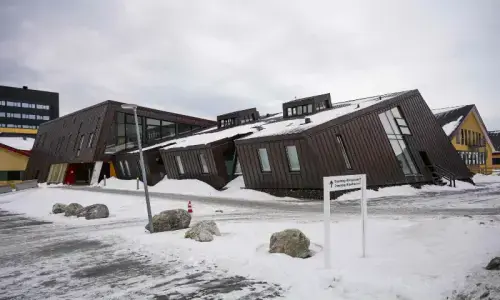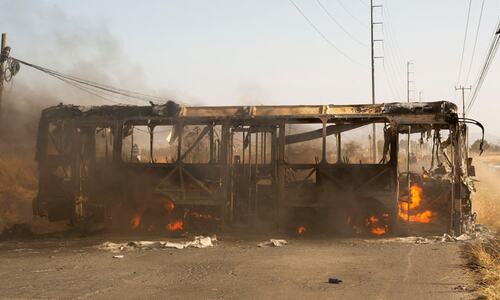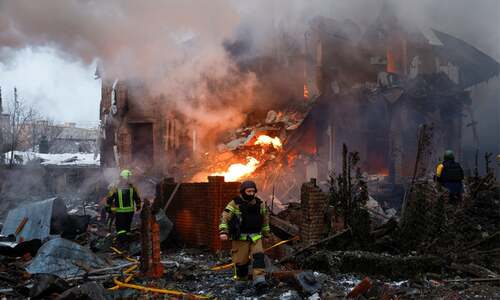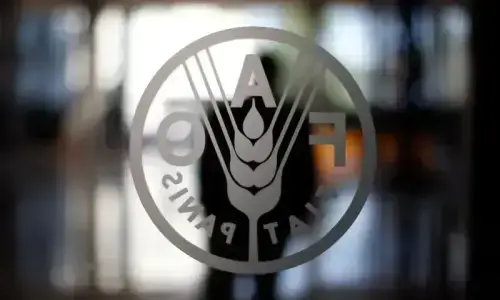
WHEN Steve McCurry took that iconic photograph of the ‘Afghan girl’ back in 1985, he never imagined that the girl with the haunting green eyes would become a worldwide symbol of the disruption and displacement that millions of refugees suffered in the aftermath of the Soviet-Afghan war.
McCurry’s photograph did little to change the life of Sharbat Gula, who last week was arrested in Peshawar by Pakistani authorities on charges of fraudulently obtaining a Pakistani residence card, or CNIC. Authorities plan to prosecute her and the two men claiming to be her sons for falsifying their personal details to obtain CNICs instead of the refugee registration cards that protect 1.5 million Afghans here from being deported.
According to Gerry Simpson of Human Rights Watch, a million more Afghans who failed to get the registration card are in danger of being deported. Sharbat Gula was one of those one million; she is charged with bribing government officials to falsify her documents to be able to remain in Pakistan. She will be jailed and fined if proven guilty, and on her release, deported back to an Afghanistan still ravaged by conflict, and home to one million internal refugees.
Life for women refugees is a particular kind of hell.
The UNHCR lists Pakistan as the second highest refugee hosting country in the world, second only to Turkey’s 2.5m Syrians fleeing the Syrian civil war. Pakistanis tout this honourable position quite proudly, using it as proof of the nation’s generosity and compassion. A developing nation with limited resources playing host to 1.5m refugees is something to be proud about. At the same time, Pakistan needs to remain vigilant about those who abuse the system, especially those who obtain Pakistani documents illegally as a cover for any type of criminal activity.
Yet public attitudes towards the refugees have swung the other way in the wake of the government crackdown against Afghans, in which 350,000 refugees have already returned to Afghanistan this year alone. Previously, they were seen as Muslim brothers and sisters, and a vital part of the country’s economy, especially in the construction industry. Now, Afghans are being blamed for all crime and terrorism in Pakistan, and news of Sharbat Gula’s arrest is being met with a mix of rancour and vehemence by Pakistanis who have tired of playing host to a seemingly ungrateful and treacherous population.
The case of Sharbat Gula, and many other non-criminal refugees desperate to find a way to stay on, whether legally or illegally, is not a sign of the maliciousness of an individual, or even the ingratitude of a parasitical community. Rather it is proof that the system is overwhelmed, and that Pakistan’s mass refugee return policy has flaws which are creating more insecurity and turmoil than it was designed to prevent.
More than this, Sharbat Gula’s complicity in identity fraud is illustrative of what happens to vulnerable female refugees, especially women who may be illiterate and unable to read what they sign, or are unaware or unclear of the legal ramifications of their actions.
To a penniless Afghan woman who has lived all her life only thinking about survival, forging identity papers for money may have seemed like a good idea at the time. And pressure from others to go along with the plan, as well as being told that ‘everyone does it’, and ‘they won’t punish a woman’, may have been all it took for Sharbat Gula to put her thumbprint on a piece of paper in order to earn some breathing space in an increasingly hostile environment.
Life as a refugee is terrible, but for women refugees, it’s a particular kind of hell that most of us can’t even imagine. Women refugees are extremely vulnerable to sexual assault and exploitation; they have to deal with being groped or assaulted by smugglers, security staff and even other refugees. They struggle with finding adequate food or healthcare for their children, and become the heads of vulnerable households where male family members are missing or dead. Access to adequate reproductive healthcare is minimal, especially in war zones: being pregnant or having to give birth as a refugee is a thousand times more difficult than it is for a normal citizen.
People often remark that Sharbat Gula as an adult woman looks very different from her photograph as a 12-year-old. The journey she has undertaken and the life she has led as a refugee has left its mark on her face, its weather-beaten skin and jutting bones testament to her suffering.
This is no excuse for breaking the law in Pakistan, but perhaps it can help us understand why she was so desperate to stay here that she would do so. If you can imagine yourself as a refugee for just one moment, you might realise that you would probably consider doing it too.
The writer is an author.
Twitter: @binashah
Published in Dawn, October 30th, 2016
































